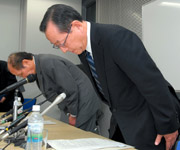As part of Tokyo’s Earth Day festivities last weekend, author/rapper Seiko Ito held a poetry reading set to techno music, dedicated to the message of setting Burma free from tyranny. From the Burma Info website:
In the following video clip of the performance, Ito can be seen reading his statement, demanding that the military regime stop killing, beating, and imprisoning monks, and enter into dialogue. Htin Aung, the Democratic Voice of Burma stringer in Tokyo , reads out a statement in Burmese.
With a double DJ, Ito’s reading quickly turns into a hip-hop event. The audience rises, and many begin dancing and responding to Ito ‘ s calls, waving arms, signs, and in some cases, babies. It was likely the first time ever that this many Japanese in one place expressed their support for a free Burma.
Watch the video here.
Here is my unauthorized translation of the poem:
You must not intimidate the nonresisting monks
You must not beat the nonresisting monks
You must not imprison the nonresisting monks
You must not kill the nonresisting monks
For they are outside the realm of power
And live under a wholly separate Law
Intimidating, beating, imprisoning, and killing such people is an overwhelming failure to understand, an overwhelming act of violence, in short the destruction of the other.
And, we too are the Other!
You must not intimidate the nonresisting monks
You must not beat the nonresisting monks
You must not imprison the nonresisting monks
You must not kill the nonresisting monks
For they are outside the realm of power
And resolutely possess a freedom to live under a wholly separate Law
Intimidating, beating, imprisoning, and killing such people is an overwhelming failure to understand, an overwhelming act of violence, in short the destruction of the other.
You must not destroy others
You must not destroy them, nor us
Don’t intimidate them!
Don’t beat them!
Don’t jail them!
Don’t kill them!
The junta in Myanmar
The Chinese government!
Free Aung San Suu Kyi!
Free Aung San Suu Kyi!
Free the Dalai Lama!
Free the Dalai Lama!
We are they
And they are we!
You must not refuse dialogue!
For dialogue is the sole path to connect the other with the other
If the other and the other are not connected, hence springs intimidation, hence springs beatings, hence springs imprisonment, and hence springs murder!
So talk to them! Talk to them!
Communicate for the sake of dialogue!!
Freedom of speech and freedom of the press exist to prevent intimidation, beatings, imprisonment, and murder
Calling for dialogue and communication is to stand in the way of intimidation, beatings, imprisonment, and murder
The junta in Myanmar
The Chinese government!
Talk to them! Don’t intimidate them!
Talk to them! Don’t beat them!
Talk to them! Don’t jail them!
Talk to them! Don’t kill them!
Talk to them!
We are they
And they are we!








